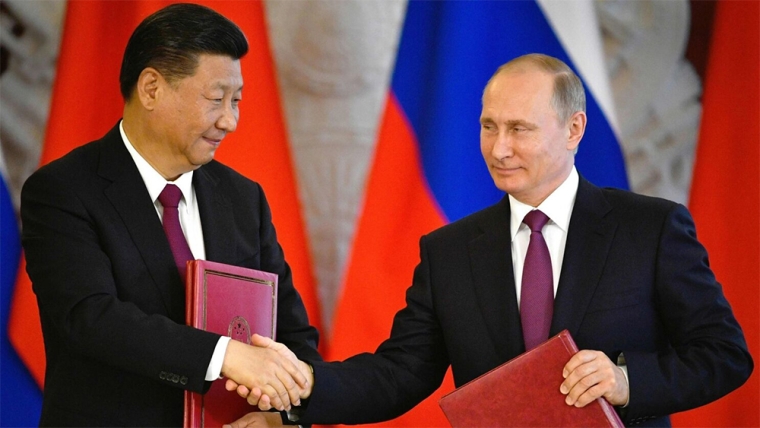
This profile has been made possible by our Supporters. Join them and help us improve our free content, available for every reader.
By Dong Xing*
As the world anxiously watches the Russia-Ukraine crisis unfold, China remains wedged in an awkward position.
Beijing has declared that its partnership with Moscow has "no limits" while still maintaining strong ties with Kyiv.
Under the premiership of Xi Jinping, China has furthered its deep strategic and business partnerships with both countries, leaving it hesitant to pick a side openly.
Not only is China Ukraine's largest trading partner, but Kyiv has also helped Beijing build up its military assets.
China's Foreign Minister Wang Yi said over the weekend that all parties should return to the 2015 Minsk Agreement — a road map towards peace in war-torn eastern Ukraine.
He said "certain major countries" were contributing to a new Cold War mentality and that the sovereignty, independence and territorial integrity of all countries should be safeguarded.
"China expects all parties to find a solution that is truly conducive to safeguarding European security through dialogue and consultations," Mr Wang added.
It echoed comments earlier this month from French President Emmanuel Macron, who said revival of the Minsk Agreement was the "only path on which peace can be built".
'China cannot directly oppose Russia'
Jiang Yuan, a China-Russia relations expert at the Queensland Technology University, said China had no intention to openly express sympathy for Ukraine, while it hasn't fully supported Russia either.
There's a third consideration at play too, as experts say China doesn't want to push the EU away by supporting Russia.
As many other countries urge their citizens and embassy staff to leave — some being evacuated even — China has only advised its citizens to remain vigilant.
It has slammed the West for creating an air of tension, yet there is still no strong indication of whether it's Russia or Ukraine that China favours.
So how much is the silence as much about domestic politics as international relations?
And can Beijing continue to have it both ways with two countries in heightened states of military awareness?
Ukraine crisis may shake China's stance on Taiwan, Xinjiang and Tibet
Australian Prime Minister Scott Morrison has criticised China for remaining "chillingly silent" on the crisis, suggesting that Beijing had given Moscow tacit approval for an invasion.
But it is not the first time China has kept quiet on Ukraine's disputes.
In China, self-determination and foreign interference on sovereignty are political taboos, with there being strong opposition to separatism in Tibet and Uyghur-dominated Xinjiang, and Taiwan's increasingly independent self-identity.
In 2014, 97 per cent of voters in Crimea backed a move to leave Ukraine and join Russia.
Western countries tried to scuttle the outcome at the UN, but it was unsuccessful.
Tellingly, while Russia rejected the resolution pushed by the West, China abstained.
According to Mr Jiang, this has more to do with internal politics than external relationships.
"It is simply impossible for China to shore up the recognition of reincorporation of Crimea in the Russian narrative or the recent Ukraine tensions," he said.
Basically, supporting succession abroad might come back to harm the Chinese Communist Party, Mr Jiang explained.
"Crimea is Ukraine's sovereign territory. If it can simply have a referendum to join Russia or become independent, this means Xinjiang, Tibet, and Taiwan can simply do so as well," Mr Jiang said.
"This is impossible for China to accept because these are core interests of the Chinese government and also concern legitimacy of the Communist Party."
Ukraine is China's military technology provider
As a former Soviet Union state, Ukraine inherited much of the military technology and equipment China desired.
So it started buying what it wanted from Ukraine, the most significant of which was China's first aircraft carrier, the Liaoning.
The unfinished aircraft carrier became China's in 1998 and helped modernise its military infrastructure.
"The Chinese Navy was thereby able to leapfrog an estimated 15 years of research and development to achieve aircraft carrier capabilities in 2013 when the Liaoning entered active service," Mr Jiang said.
Since then, several of China's large warships, including the country's second aircraft carrier, the Shandong, have used propulsion systems with redeveloped Ukrainian gas turbines.
Ukrainian engineering has also helped boost China's fighter jet fleets.
Ukraine was responsible for aiding in the development of China's J-11 jets, which are considered an equivalent of America's F-15 fighters.
'China doesn't want to push the EU towards the US'
The full scale of the arms trade between China and Ukraine is unknown, but since 2020 China has been the eastern European country's top trading partner.
China also sees Ukraine as a key entry point for its Belt and Road Initiative (BRI) objectives, its ambitious global infrastructure development strategy.
China's Ministry of Commerce has said Ukraine could be used to explore investment opportunities in the EU as it has a free trade agreement with the EU while being a participant in the BRI.
Experts have also pointed to China's need to maintain a workable relationship with the EU, especially Germany, during increasingly intense US-China competition.
Dr Jade Guan, a lecturer in strategy studies at Deakin University, said China was seeking to further its negotiations with the EU over the Comprehensive Agreement on Investment (CAI).
The CAI, designed to open China's domestic market, will give enormous advantages to European companies.
Under the agreement, China promises to no longer force foreign companies to share sensitive know-how.
However, the deal was suspended after the EU and China both imposed sanctions on each other's officials and institutions over claims of Uyghur "genocide".
"Germany and France are leading the negotiation of the CAI with China, and France will have its election soon," Dr Guan said.
While "it would be wise for Beijing not to support Russia openly," Dr Guan added that eventually China will need to weigh Ukraine and Russia.
16 Comments
Thanks for the article, I have certainly learnt a lot I wasn't aware of, before reading it.
I second that. I sometimes wonder if these world strategy leaders have a giant whiteboard to figure out all the permutations.
Interesting too the accounts of the referendum mentioned above, which on the surface of the above mention appears highly conclusive.
Getting curious about that, turns out it was actually held under the presence of Russian troops, boycotted by some non-ethnic-Russian groups, and "The referendum's available choices did not include keeping the status quo of retaining arrangements enacted by the 1998 Constitution of the Autonomous Republic of Crimea."
https://en.wikipedia.org/wiki/2014_Crimean_status_referendum
The Historical Precedent set by the United States and Western Allies ... Lest we forget... Link
PRISTINA (Reuters) - Europe’s major powers and the United States said on Monday they recognized Kosovo’s new independence, as Serbs reacted with anger and some states warned that its secession from Serbia set a dangerous precedent.
Interesting. Whether it's a precedent or two wrongs making a right or a more-wrong is also for ruminating upon...
The most curious thing for me is seeing a surprising level of uniformity in perspectives and pro-Putin sentiment in New Zealand's nominally right-leaning folk. Googling around now, I see that's also common to the USA and certain media, pundits etc.
I myself do not know enough about the issues to hold a stance - not at all. Merely just noting I've been very surprised to see such uniformity and profession of correctness in NZ's nominally right-leaning commenters. Wonder if it's a product of the certain media.
The precedent was set when India invaded Goa. Established a precedent for countries invaded because of geography: East Timor, Falklands, Kuwait, Crimea.
Poland, if we count the precedent of "protecting our people" too?
The Spratley Islands if we count places invaded for geography or resources.
Those are/were all very different issues:
The annexation of Goa was India reclaiming its territory back from Portuguese colonialists. The Falklands were unclaimed and uninhabited before the Europeans arrived on the islands.
Crimea was officially transferred by the USSR to Ukraine SSR under Nikita Khrushchev; the Russians challenge the legitimacy of this official decree.
When reasonably young I met RewI Alley a couple of times. Strong convincing advocate of whatever he believed in coupled with an ability to tell a good yarn, with humour. Two things I recall was the description of Chinese society about which, although certainly a cliché, inscrutable is undeniably accurate. And the other being what had become regarded then, as the bamboo curtain. The above column indicates to me that nothing much has changed.
Yup, great to get perspectives other than just Oz, US, UK etc.
While "it would be wise for Beijing not to support Russia openly," Dr Guan added that eventually China will need to weigh Ukraine and Russia.
"Both countries are strategic partners for China, but which one is more important in terms of economy, energy and diplomacy?"
India, China in Europe’s Crisis
New Delhi, like Beijing, also needs to take a stance of ‘positive neutrality’ supportive of Russia.
The remarks by China’s State Councilor and Foreign Minister Wang Yi at the Munich Security Conference on Saturday constitute the first full statement on Beijing’s stance regarding Russia’s current tensions with the West and its sub-plot surrounding Ukraine.
Another view from David Goldman ('Spengler') at Asia Times. Published before the Peace (piece?) Keepers op, mind.
"Putin has shown NATO to be a Potemkin Village with nothing uniting its members except rhetoric"
Maybe. But if it erupts, if it ignites, to the extreme that all of NATO, are led to act and engage as undertaken under their co-signed charter or whatever, then that is a hugely formidable force. That is undeniable. Just count up the nuke subs 97 vs 33. Can hardly imagine that Putin is unaware of that.
He is likely well aware of that, which is why they are likely prepared to go to extremes to keep Ukraine out of NATO.
Very important fact missed: Ukrainian Govt let down Chinese investors by nationalizing Motor Sich. This is a result of direct request from states. Ukraine is just a situational technology partner. Russia is a strategic ally. Ukrainians also have close connections with Lithuania who managed to ruin their relationships with China recently.

We welcome your comments below. If you are not already registered, please register to comment
Remember we welcome robust, respectful and insightful debate. We don't welcome abusive or defamatory comments and will de-register those repeatedly making such comments. Our current comment policy is here.